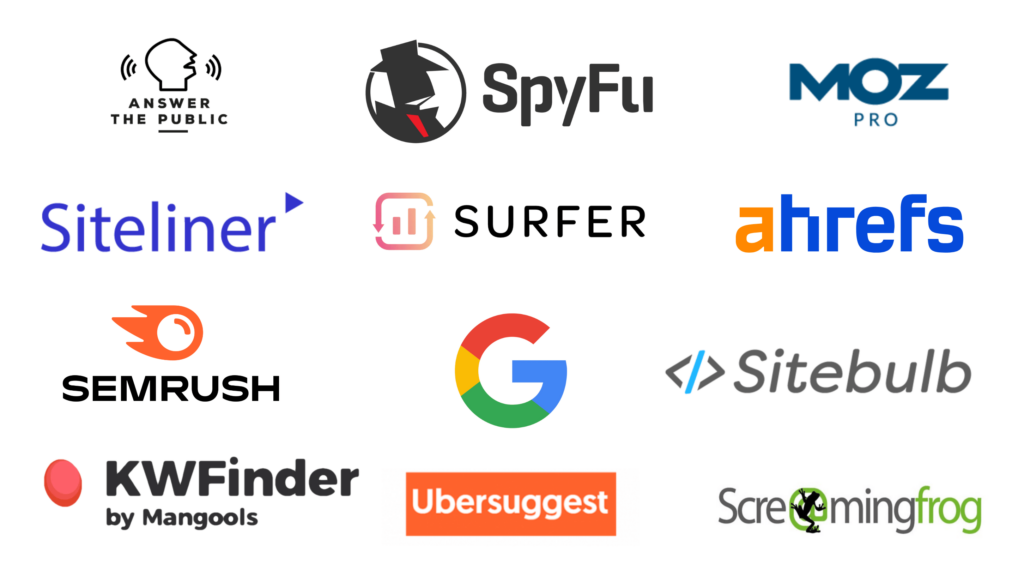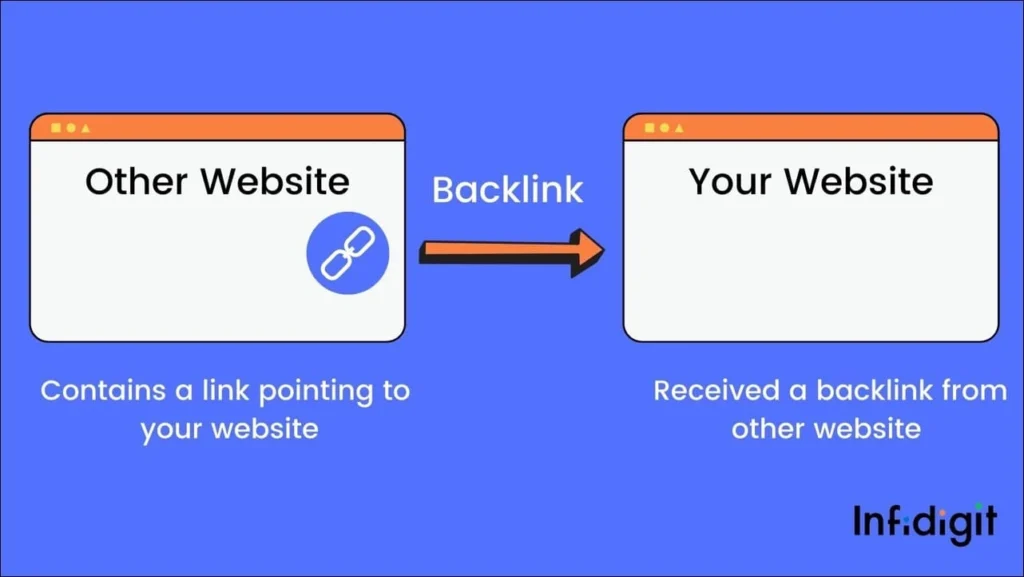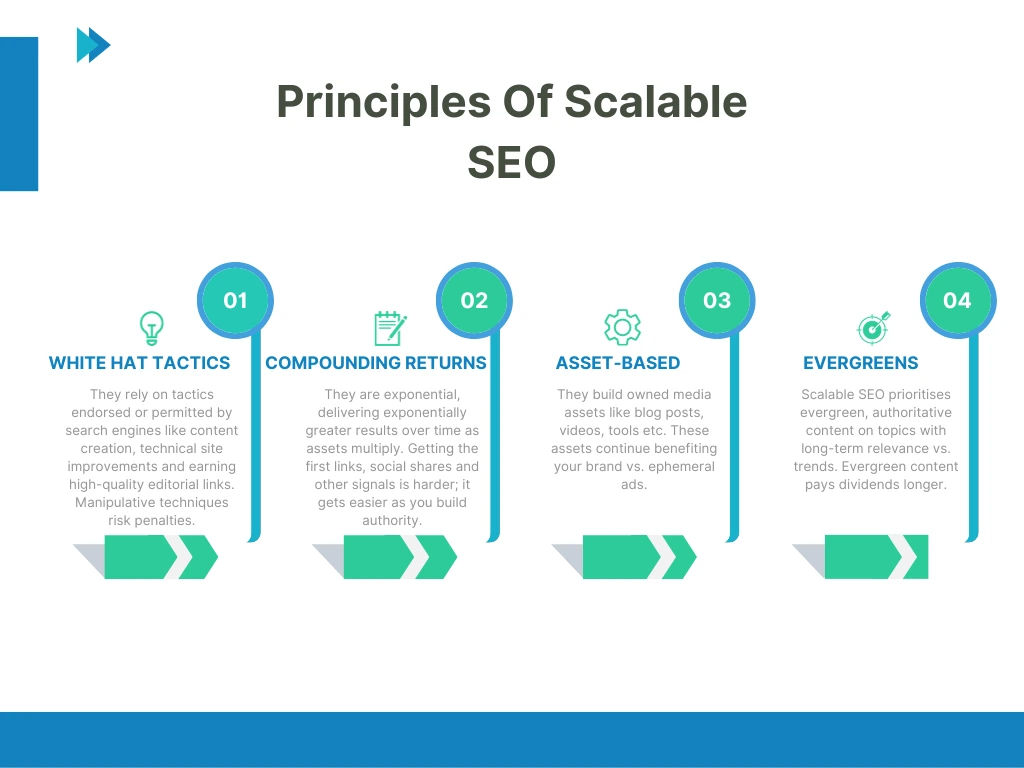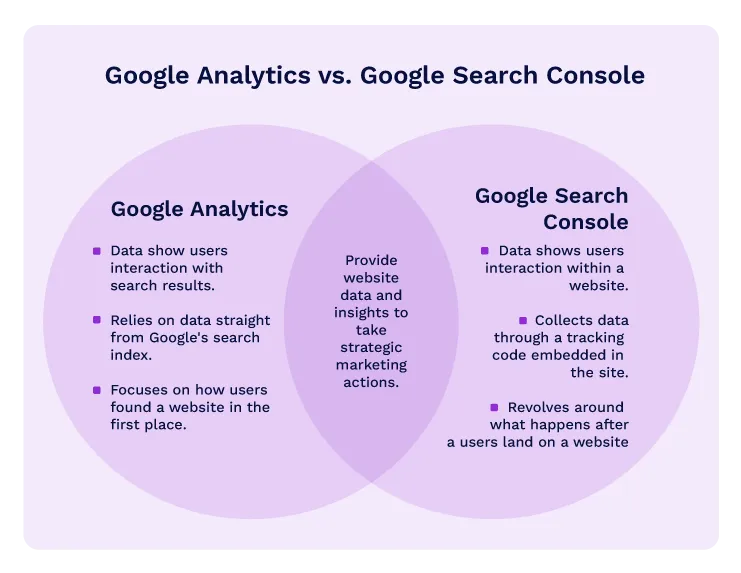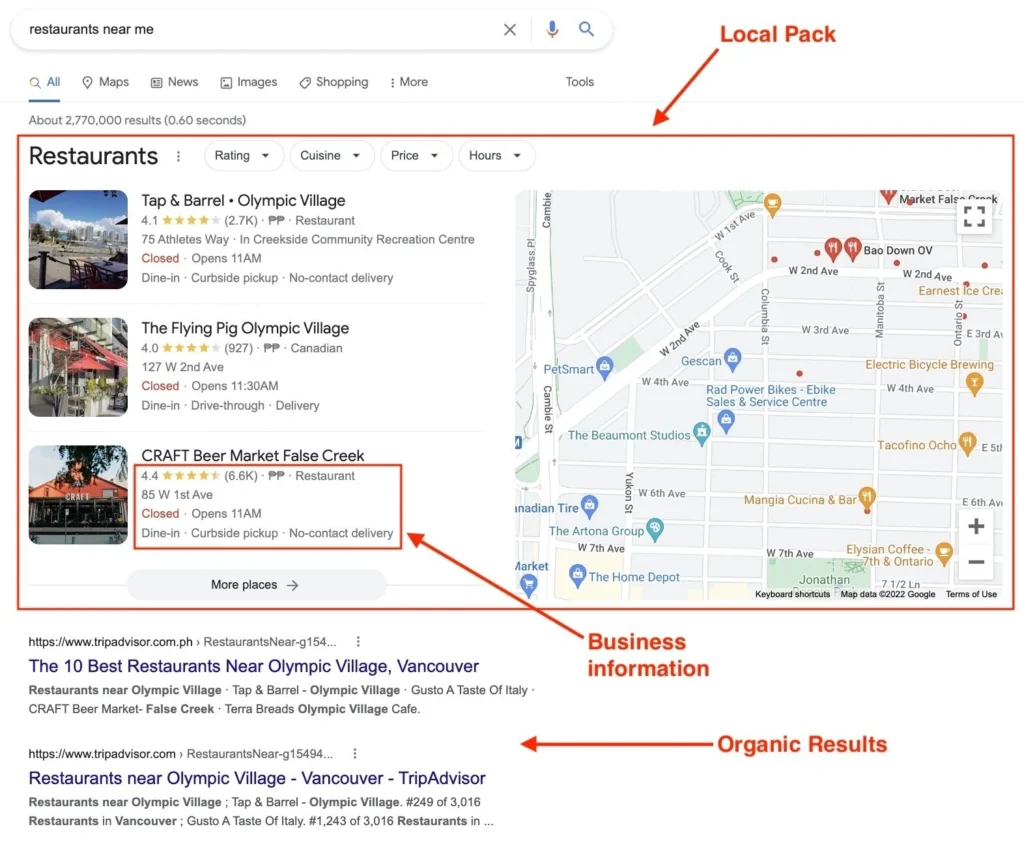Introduction
In the digital marketing world, SEO is always part of the conversation, but for SEO agencies, it’s the entire conversation.
Every SEO agency’s goal is simple: help clients rise up in search rankings.
The tricky part? Finding the best SEO software for agencies to help you get the job done.
With so much SEO software for agencies, it’s a real challenge to find an affordable SEO tool that balances features and client expectations.
In this blog, we’ll address that problem by breaking down three key areas every SEO agency should consider when selecting SEO software: qualities and features of SEO software, SEO functionalities, and comparing pricing models and value propositions.

Introduction to SEO Software for Agencies
If you search for SEO software for agencies on Google, you’ll quickly see there’s no shortage of SEO software.
Each SEO software you find is designed to serve a specific purpose for different types of agencies.
Before deciding on the best SEO software for your agency, make sure you’re well-acquainted with the top SEO tools that rule the SEO space.
- Keyword Research Tools
Keyword Research Tools are easily one of the most popular tools in the SEO space.
These keyword research tools have become the favorite SEO software of many SEO agencies, especially those that specialize in creating blog content, writing product descriptions, crafting landing pages, and managing paid search campaigns.
- Backlink Analysis Tools
We really can’t underestimate the role that high-quality backlinks play in achieving SEO success. While strong backlinks boost domain authority with search engines—especially Google—low-quality ones can damage your website’s reputation.
Using a backlink analysis tool, agencies can look into impactful SEO metrics like Domain Authority, Trust Flow, and Citation Flow to evaluate the strength and reliability of each backlink.
- Rank Tracking Tools
With a rank tracking tool, you can easily see where your clients rank on Google.
With that information, you can evaluate your ranking strategies effectively while focusing on important adjustments you might need to make.
- Content Optimization Tools
When you implement changes but still notice no progress, non-optimized content is often the reason.
A content optimization tool can be your best friend in fixing this and producing optimized content overall.
These tools usually check important metrics such as keyword density, readability scores, and content length.
- All-in-One SEO Tools
If you’re not into juggling a bunch of SEO software for agencies and want to skip the trouble of buying or trying each separate tool for various functions, then these all-in-one tools are exactly what you need.
“All-in-one” isn’t just a label. It’s exactly what these tools offer: every SEO feature you need in one convenient solution, cutting down on complexity.
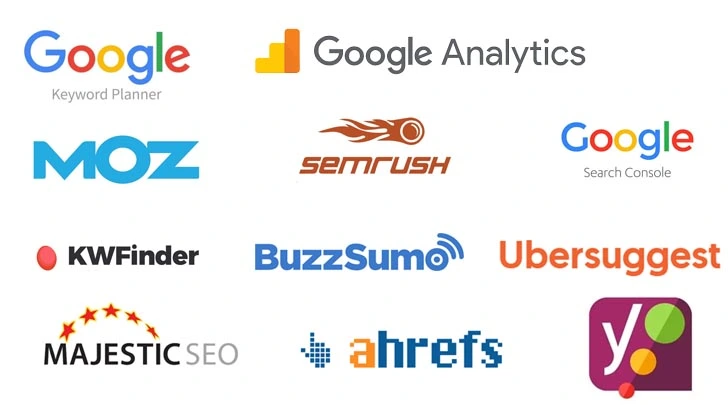
Now that you’re familiar with some of the popular SEO software for agencies, you might be tempted to go ahead and hit “buy”.
But as you go through the next sections, you’ll see why it’s not as easy as choosing just any SEO tool and expecting it to be the right fit.
Key Areas to Look Before Selecting the Best SEO Software for Agencies
Remember that whatever SEO software you choose will be a significant investment for your agency, so it’s important to select the most appropriate and best SEO software for your team.
But how do you know the best SEO software for agencies? What should be on the top of your mind? And, at the core of it, what really makes SEO software great for agencies?
To get to the bottom of this, we’ll walk through three key areas that hold the answers.
By the time we wrap up each section, you’ll have a clear idea of what type of SEO tool fits your agency best.
Key Area #1: Qualities of SEO Software
We’ll explore some of the main qualities SEO agencies need to watch for, especially when it comes to efficiency, scalability, and integration.
Key Area #2: SEO Functionalities
We’ll cover the most important SEO functionalities to look for in an SEO tool, focusing on performance and optimization.
Key Area #3: Comparing Pricing Models and Value Propositions
Let’s not overlook one often underrated aspect—the different pricing models out there and how to weigh the real value of affordable SEO software for agencies, keeping cost, features, and scalability in mind.
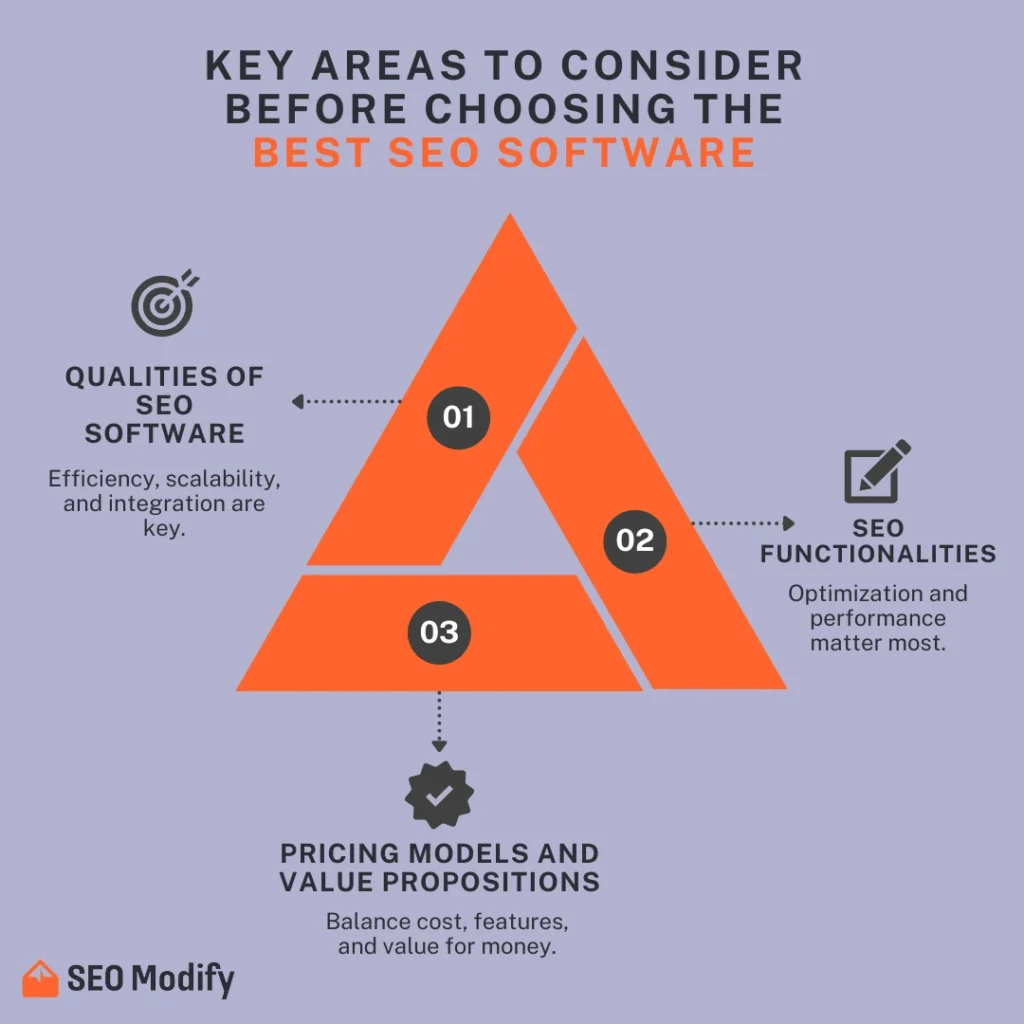
Key Area #1: Qualities of SEO Software
Some might argue that the true value of software lies in the SEO features it offers.
While the functionalities definitely matter, it’s super important not to overlook the qualities that define the SEO software itself.
Features can show you what a tool can do, but qualities tell you how well it performs those tasks and how well it fits into your agency’s workflow.
With this in perspective, zooming in on these critical factors makes it obvious what separates effective SEO software for agencies from the pack.
This clarity will help you to make informed choices that will benefit your agency’s future growth.
1. See If It’s Scalable.
Many agencies kick off their SEO journey with just a few clients, but as they consistently deliver high-quality work, they often find themselves attracting a whole lot more partnerships.
This kind of growth is the dream for every SEO agency—getting the chance to perform, evolve, and expand their reach.
But when everyone is on board to take your agency to new heights, your main SEO software suddenly decides to rain on the parade by telling you that you can’t track any more keywords and that you’ve hit the project limit.
When that happens, you find yourself in a lose-lose situation.
Switching to a new SEO platform can disrupt your workflow and rack up costs you weren’t expecting.
If you decide to stay with a limited-functioning service, you face performance dips that can frustrate your clients. No matter what choice you make, you risk losing valuable time and jeopardizing client satisfaction.
That’s why you need to prioritize scalable SEO software for agencies. Scalable means that as your client base grows, your SEO software grows along with you instead of trying to hinder your growth.
As we mentioned previously, If your primary SEO software limits the projects you can start, keywords you can track, or any other functionalities, this lack of cooperation from the software’s side can become a painful bottleneck.
The right SEO software for agencies will let you track more keywords and provide additional features as your client base continues to grow.
This kind of flexibility means you can manage more projects without any limitations.
2. See How It Integrates with Existing Tools
If you’re running an SEO agency, managing different tools is probably part of your everyday life. This constant back-and-forth between software can take up valuable time and distract you from what really matters.
But when you find SEO software for agencies that integrates smoothly with other software, you can cut down on browser tabs.
What this means is that your data—whether related to SEO, client management, or campaign progress—is connected and can be found in one central place.
What’s the best part about using these integrations?
They take a complicated workflow and simplify it completely. You get to work faster and more efficiently, which really maximizes the impact of everything you do for your SEO initiatives.
If you want precise data tracking and analysis, you should prioritize SEO software that integrates seamlessly with important platforms like Google Analytics and Google Search Console.
Integration with Google tools is a solid start, but it’s only one piece of the puzzle.
You also need to look into whether your chosen SEO software can effortlessly connect with other key agency tools, like Trello or Asana, and any other applications that fit into your workflow
A strong integration capability is definitely a good thing to look for.
Check if the tool offers API support to create custom integrations with any in-house or less common software your agency uses.
3. See If It Can Automate Routine Tasks
If you have to manually tackle every single task—like conducting site audits, tracking keywords, and generating reports—it’s going to take forever.
But here’s the good news: if you have an SEO tool that can automate those processes, it can speed up tasks that would usually eat up hours of your day.
That’s why you should definitely keep an eye out for SEO software for agencies that offer automation capabilities.
Some SEO tools come with the ability to automatically track and monitor the quality of backlinks. Tools with this functionality usually send notifications to your team whenever there are changes that could impact SEO performance.
Plus, if you invest in SEO software with automated reporting capabilities, it can regularly generate client-facing documents, giving consistent updates without the hassle of manual compilation.
As we talked about earlier, when your client base starts to expand, it’s super important that everything in your team—SEO software included—is helping to fuel the agency’s growth.
With automation in place, your team doesn’t have to worry about routine tasks slowing them down.
Automating tasks like audits and keyword tracking means your crew can spend their time on strategies that actually foster business growth, rather than getting caught up in those mind-numbing tasks.
4. Look Into It’s User Experience
Do we genuinely have to pay attention to the user experience of SEO software? Absolutely.
It plays a significant role in determining how quickly and efficiently users can accomplish their tasks.
When you start looking at the UIs of SEO software for agencies, you’ll notice tons of tabs for different functions. Since most SEO tools, especially all-in-one solutions, are loaded with features, it’s really important that they’re user-friendly and easy to navigate.
When SEO software is user-friendly, frustration levels drop, and that leads to happier team members who are more engaged and motivated to deliver great results.
An intuitive interface means your team can access clear data insights easily. This will help them make quick, informed decisions, in the right direction without second-guessing themselves.
Key Area 2: SEO Functionalities
Now that you’ve got the key qualities of a good SEO tool figured out for your agency, it’s time to dig into the features that truly make everything work.
We have established qualities like scalability and ease of use are the foundation.
But we should not forget that it’s the features that deliver the results agencies are usually after.
Let’s take a closer look at some of the essential functionalities an all-in-one SEO software for an agency should have.
These features are non-negotiable for any SEO software, whether you’re going for a full suite or piecing together individual tools.
1. Click-through Rate (CTR) Optimization with AI
CTR shows how many people are clicking on your content. If your CTR’s good, it means you’re hitting the sweet spot. If it’s bad, well, you already know it’s time to make some changes to get people clicking again.
An SEO software with CTR optimization helps by fine-tuning things like your meta titles, descriptions, and anything else your readers see upfront.
Yes, you could manually adjust those, but that is time-consuming—you would have to find out what users like and what they do not like.
That is where AI comes in.
AI reigns supreme when it comes to identifying patterns of users and understanding target audiences.
A CTR Optimizer that is AI-driven will inform you of the specific adjustments you need to make to get people to click on your content.
2. Google Search Console Integration
Most people would agree that keywords are at the heart of SEO.
These keywords, which capture the intent behind users’ search queries, help businesses figure out what their customers are really after.
Google’s very own tool, Google Search Console, is basically the go-to keyword tool if you want to sink your teeth into these “keywords” and make sense of them.
So, no matter what SEO software you’re considering for your agency, it better have the ability to integrate with Search Console. Plenty of tools already offer this integration, but check how they pull insights from it, how easy those insights are to understand, and how valuable they are.
The integration should also give you real-time data so your agency can quickly tweak its strategies based on what’s working and what’s not.
3. Accurate and Local Rank Tracking
As a digital marketing or SEO agency, you probably work with clients who want to dominate their local searches.
An accurate local rank tracking feature is a must-have for this reason—it lets you see how well your clients are doing in specific locations.
With that data, you can keep them ahead of the competition and fine-tune strategies to stay on top.
If your agency deals with local businesses regularly, make sure you’re using SEO software for agencies that track keyword performance by region.
It’s the key to keeping your clients strong in their local markets.
4. Backlink Tracking
Even though they are called backlinks, these backlinks always take the “front” seat when it comes to SEO.
But simply knowing they exist and knowing how to link them up isn’t enough in this era of SEO. you’ve got to know how to maximize them — well, not you, your SEO software should know how to do that.
How can you know if your SEO software is cut out for this?
Well, outside of the basic backlink functionalities, keep an eye out for the below features.
Link Quality Assessment
If you are looking for reliable SEO software for agencies, it should be able to analyze the quality of backlinks—using domain authority, spam score, and other SEO metrics—to help you understand which links are boosting your rankings and which ones are hurting them.
Anchor Text Analysis
It should also give information on anchor texts. This way you can ensure that the links are going in accordance with your target keywords and the SEO plan.
Export Functionality
You would be surprised at how many SEO software do not let you export data unless you are on the premium tier.
You need to check that your SEO tool can export backlink data in formats such as CSV or PDF. This capability makes it super easy to report and share valuable information with others.
5. Page Auditing
For agencies, all you can really do is give your best in SEO and wait for the results to come in.
However, if you start seeing poor performance, it’s important to dig deeper into what’s not working.
That’s where audits come into the picture. They help you identify common SEO problems like broken links, slow loading times, missing meta tags, improper header usage, and duplicate content.
These problems can occur frequently, so it’s a good idea to conduct page audits at least quarterly or after significant website changes to ensure everything is on point.
Running audits by hand can definitely drain your resources and consume your time.
But here’s the good news: you can cut down on both time and hassle while keeping your websites in tip-top shape.
All you need to do is invest in SEO software for agencies that includes automatic page audit functionality.
This way, you can tackle potential issues before they snowball into bigger problems.
Here are some essential functionalities that a solid SEO audit tool should offer:
Granular Issue Detection
Try to find tools that reveal not only general problems, but also such severe ones as 404 errors, redirect chains, and incorrect setting of canonical tags.
SEO Impact Analysis
The tool should assess the SEO implications of the identified problems, which will assist agencies in determining which solutions will be most beneficial to clients.
Bulk Auditing Capabilities
Perfect SEO tools enable agencies to perform audits for several pages or even the whole site at once, which is helpful when working with big clients.
Detailed Change Log
By tracking all changes made after each audit, agencies can see how well the measures they put in place are working and adjust them for the next round of audits.
6. WordPress Integration
WordPress is one of the most popular CMS platforms because of its simplicity and functionality.
With WordPress, you can access plugins that bring all your tasks directly into one dashboard. When selecting an SEO tool, choose one that integrates seamlessly with WordPress.
Look for tools that provide a single dashboard experience, combining SEO insights, performance metrics, and content management.
This integration cuts down on the need to switch between multiple tools, simplifying workflows and helping you manage all your tasks more efficiently.
Key Area 3: Comparing Pricing Models and Value Propositions
Pricing models for SEO software can get pretty overwhelming for agencies because there are so many options out there.
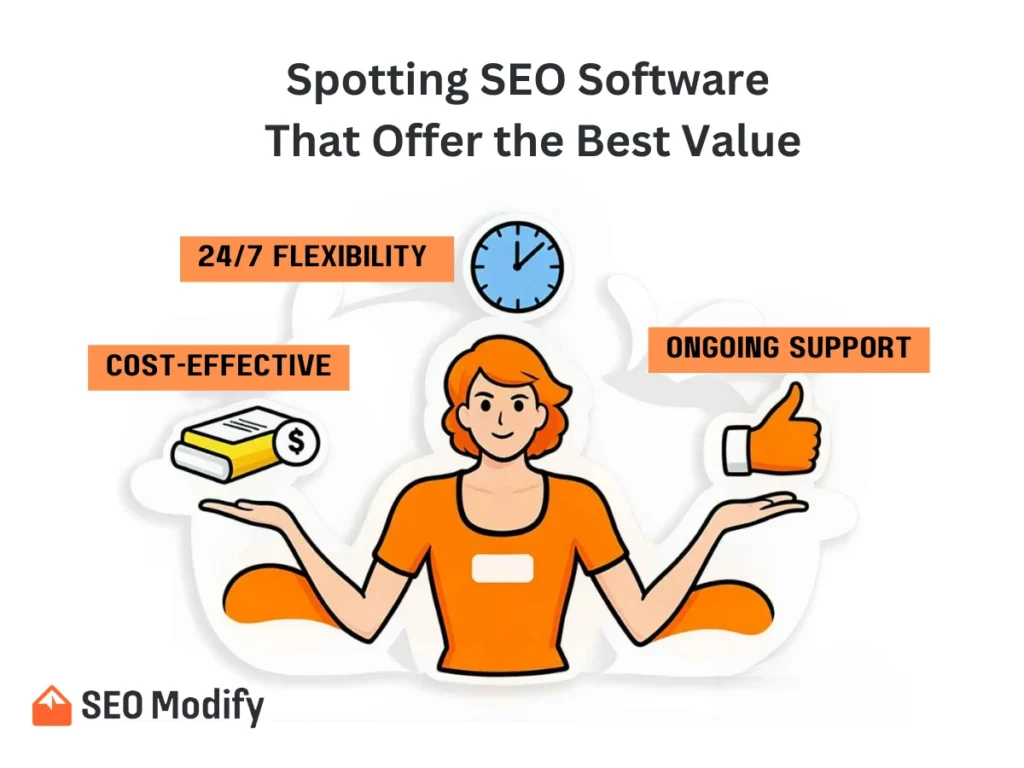
You can choose from free tools, subscription-based services, one-time purchases, or even pay-as-you-go models.
Every option brings its own set of perks and downsides, which is why it’s important to think about which affordable SEO software fits your agency’s goals.
In the end, choosing the right pricing model can support growth without stretching the budget too thin.
Pricing Model #1: Free SEO Software for Agencies
We’re living in a world full of free SEO tools, and there’s almost a free tool for just about everything these days.
If you’re new to SEO, these free tools are a great way to dive in without spending a dime. They come with essential features like keyword tracking, site audits, and some simple analytics to help you get a feel for the process.
While these tools can give individuals or small agencies a good starting point, remember they don’t offer the advanced features needed for a truly successful SEO campaign.
Pros:
- Cost-effective: These tools don’t require any financial investment from users, so they’re available to everyone.
- Basic functionalities: They’re practical for the essential SEO services.
- User-friendly: Many of them hit the market with simplicity in mind, making them easy to use.
Cons:
- Limited features: They’re missing the features that might be necessary for tackling complex SEO projects or those that need a broader range of tools.
- Lack of updates: Free tools can’t get daily updates or new additions, which can become a problem after a while.
- Scalability Issues: While agencies are small or have just a few clients, they can get by with free tools, but as the agency grows or takes on more clients, it might need more than just free tools.
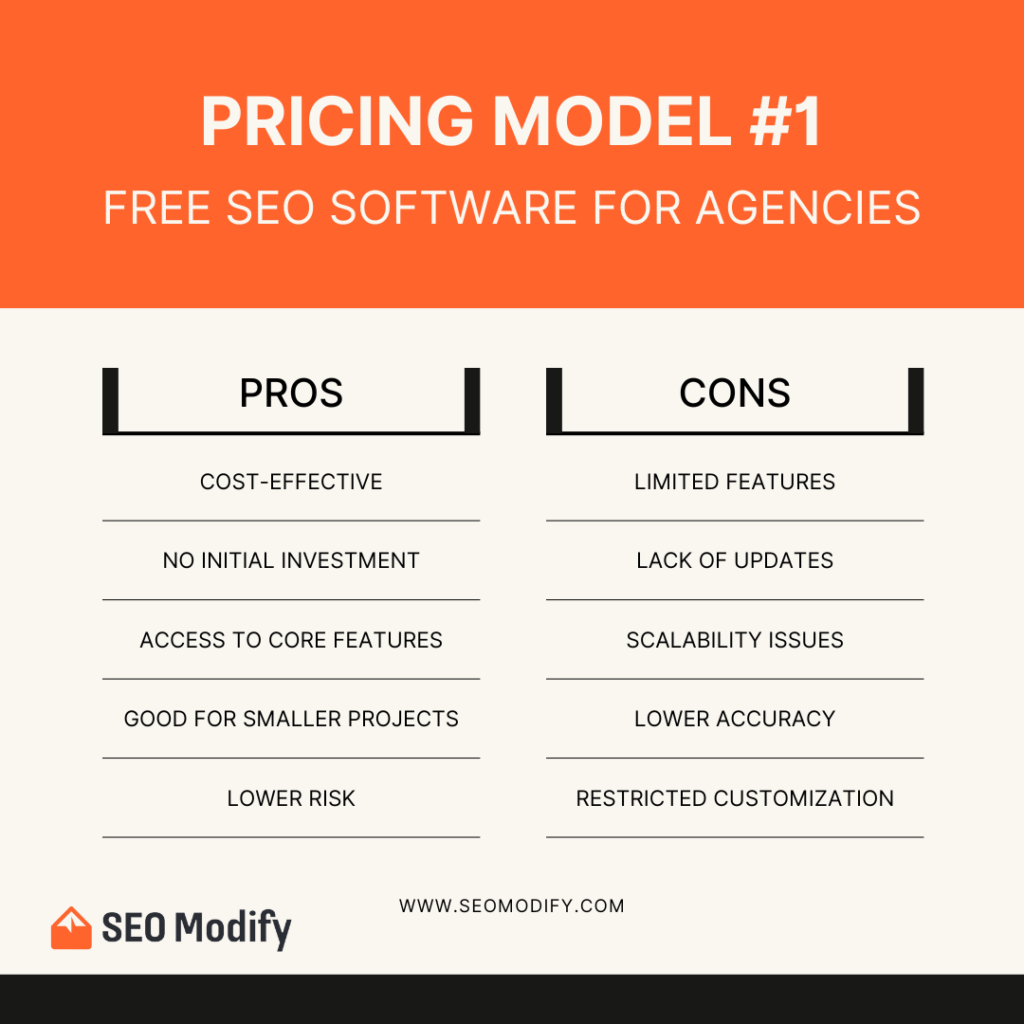
Pricing Model #2: Subscription-Based SEO Software for Agencies
This payment model is definitely one of the most popular options for SEO software for agencies.
Subscription-based SEO tools operate on a recurring payment plan, which means you either pay monthly or annually to keep using the software.
These subscription-based tools usually come with a range of features that can be scaled up or down based on how many users or projects you’re managing, making it flexible as your agency’s needs grow or change.
This model is a favorite among larger SEO platforms because it often includes regular updates and ongoing customer support as part of the deal.
Pros:
- Continuous updates: Subscribers benefit from the constant updates and enhancements of the features.
- Scalability: It is also very easy for agencies to scale up their plans as they expand and add more users or features as they wish.
- Ongoing support: Customers can always get assistance from service personnel when they are stuck, making the use of the software easily manageable.
Cons:
- Recurring costs: Those monthly fees can add up over time, and that can be quite costly for the budget.
- Commitment: This format might be disadvantageous for agencies because they may be locked into long-term deals, which can be highly inconvenient, especially if their requirements have changed.
- Paying regardless of usage: With subscription-based pricing, agencies pay the fee whether or not they fully utilize the software, which means they may end up paying for features or tools they don’t always use.
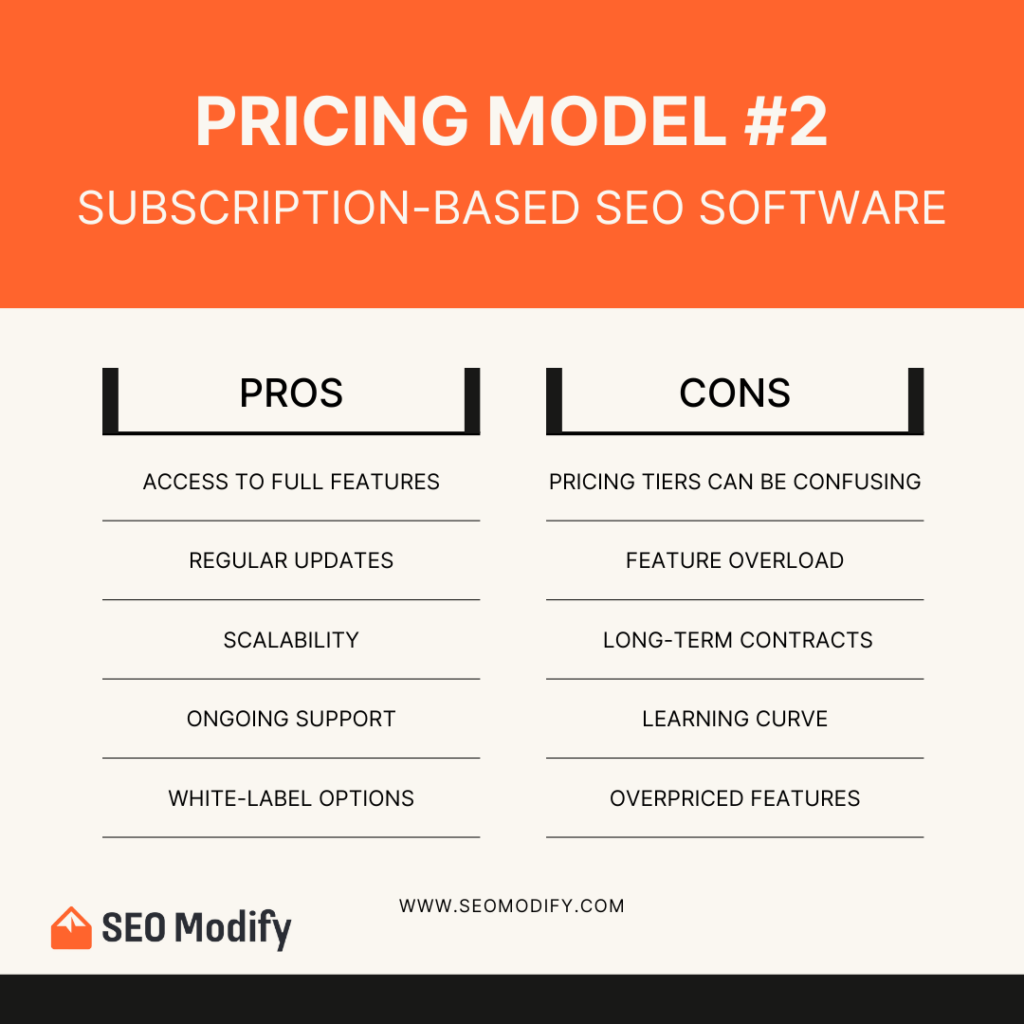
Pricing Model #3: One-Time Purchase SEO Software for Agencies
This is the pricing model where you pay once and use the SEO tool software for the rest of your life.
Such tools typically have a predetermined selection of features available with no additional costs and usually lack regular updates and extensive customer service.
This setup is really appealing to small agencies or individuals who are on a tight budget and need an affordable solution.
Pros
- Upfront cost clarity: You know exactly what you’re paying for, with no surprise fees down the road.
- Lifetime access: Once you’ve bought it, you don’t have to worry about paying again to keep using the tool.
- Simplicity: It’s great for simple tasks where you don’t need a lot of ongoing support or features.
Cons:
- Limited updates: Without regular updates, the tool might get outdated over time.
- Fewer features: These tools often don’t have the same depth or variety of features that subscription models offer.
- No ongoing support: If something goes wrong after you buy it, you’re on your own for the most part.
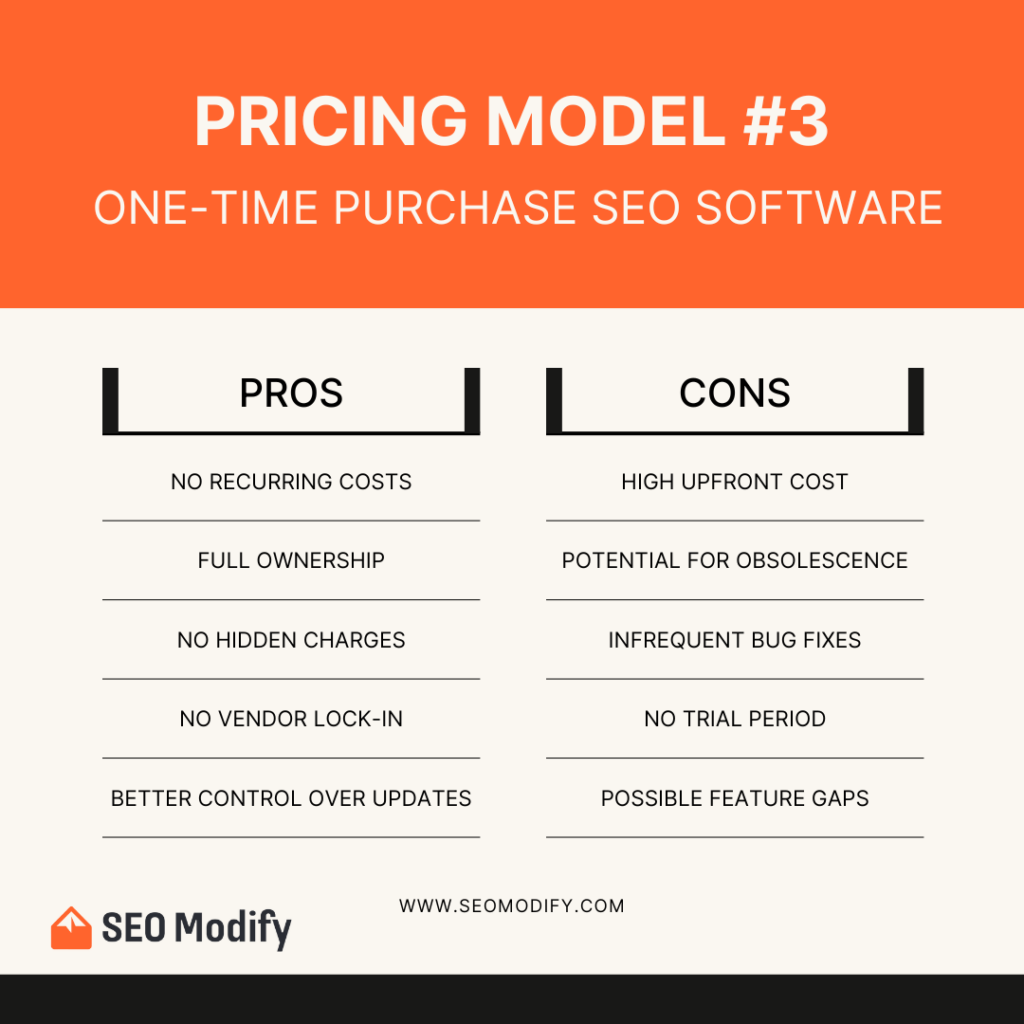
Pricing Model #4: Pay-as-You-Go SEO Software for Agencies
Pay-as-you-go, or as we like to call it – the “no strings attached” model – lets agencies pay for only what they need, when they need it. No long-term commitments, no unnecessary costs.
SEO agencies that don’t need tools around the clock will find this pricing model a great fit, especially when they want access to specific tasks.
Pros:
- Flexibility: Clients get to decide when they want to spend and how much, depending on what they need right then and there.
- Cost control: Agencies don’t have to lock into long-term deals, which makes it easier to keep their budgets in check.
- Tailored services: Clients can pick and choose the services that fit their project, so they only pay for exactly what they need.
Cons:
- Limited availability: If demand suddenly goes up, services might not always be available right when clients need them.
- Less relationship-building: Because everything’s more transactional, it can be harder to build lasting partnerships between agencies and clients.
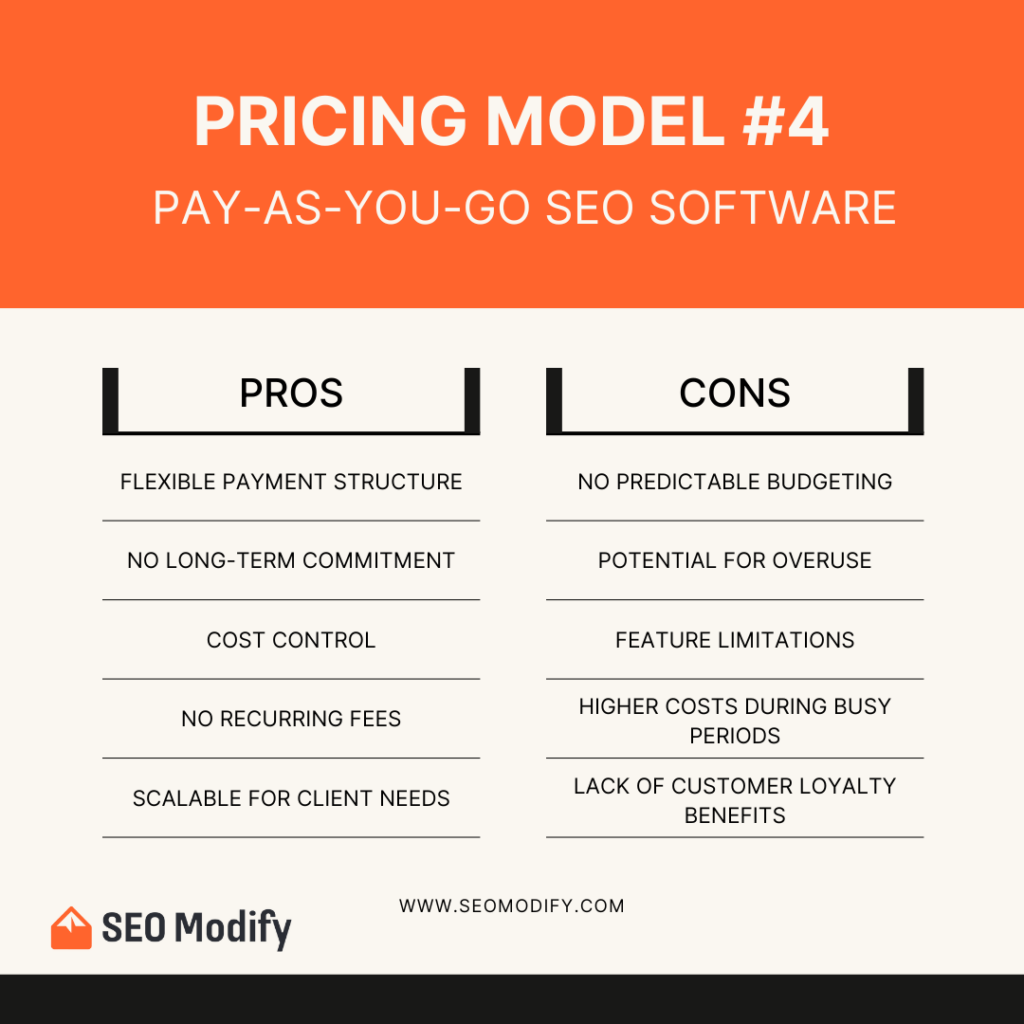
Conclusion
When it comes to finding the right SEO software for agencies, it’s important to nail the selection process.
By focusing on essential features and understanding what each tool has to offer, SEO agencies can make wise choices that support their growth objectives.
When SEO agencies invest in user-friendly, affordable, and up-to-date SEO software that facilitates scalability and integrates without an issue, it truly makes a difference for everyone.
This choice consequently lightens the load for the whole team.
And let’s not forget, that automation features can save heaps of time, allowing everyone to concentrate on delivering top-notch results.
Considering how fast the SEO world evolves, it’s vital to invest in effective SEO software for agencies.
So, why settle for anything less? Take a look at our all-in-one SEO software for agencies that has everything you need to thrive!
